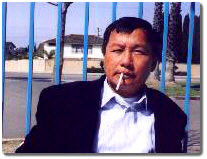
phụ trách TƯỞNG NIỆM
|
Nadezhda Mandelstam (1899-1980) An Obituary I'd like
to venture here one step
further. By itself reality isn't worth a damn. It's perception that
promotes reality
to meaning. And there is a hierarchy among perceptions (and,
correspondingly,
among meanings), with the ones acquired through the most refined and
sensitive prisms
sitting at the top. Refinement and sensitivity are imparted to such a
prism by
the only source of their supply: by culture, by civilization, whose
main tool
is language. The evaluation of reality made through such a prism—the
acquisition
of which is one goal of the species—is therefore the most accurate,
perhaps
even the most just. (Cries of "Unfair!" and "Elitist!" that
may follow the aforesaid from, of all places, the local campuses must
be left
unheeded, for culture is "elitist" by definition, and the application
of democratic principles in the sphere of knowledge leads to equating
wisdom
with idiocy.) It's the
possession of this prism supplied to her by the best Russian poetry of
the
twentieth century, and not the uniqueness of the size of her grief,
that makes
Nadezhda Mandelstam's statement about her piece of reality
unchallengeable.
It's an abominable fallacy that suffering makes for greater art.
Suffering
blinds deafens, ruins, and often kills. Osip Mandelstam was a great
poet before
the revolution. So was Anna Akhmatova, so was Marina Tsvetaeva. They
would have
become what they became even if none of the historical events that
befell Would
Nadezhda Mandelstam have
become what she became had it not been for the Revolution and all the
rest that
followed? Probably not, for she met her future husband in 1919. But the
question itself is immaterial; it leads us into the murky domains of
the law of
probability and of historical determinism. After all, she became what
she became
not because of what took place in For a good
reason, though. For a frail woman of sixty-five turns out to be capable
of
slowing down, if not averting in the long run, the cultural
disintegration of a
whole nation. Her memoirs are something more than a testimony to her
times;
they are a view of history in the light of conscience and culture. In
that
light history winces, and an individual realizes his choice: between
seeking
that light's source and committing an anthropological crime against
himself. She didn't mean
to be so grand, nor did she simply try to get even with the system. For
her it
was a private matter, a matter of her temperament, of her identity and
what had
shaped that identity. As it was, her identity had been shaped by
culture, by
its best products: her husband's poems. It's them, not his memory, that
she was
trying to keep alive. It's to them, and not to him, in the course of
forty-two
years that she became a widow. Of course she loved
him, but love itself is the
most elitist of passions. It acquires its stereoscopic substance and
perspective only in the context of culture, for it takes up more space
in the mind
than it does in the bed. Outside of that setting it falls flat into
one-dimensional fiction. She was a widow to culture, and I think she
loved her
husband more at the end than on the day they got married. That is
probably why readers
of her books find them so haunting. Because of that, and because the
status of
the modem world vis-à-vis civilization also can be defined as widowhood. If she lacked anything, it was humility. In that respect she was quite unlike her two poets. But then they had their art, and the quality of their achievements provided them with enough contentment to be, or to pretend to be, humble. She was terribly opinionated, categorical, cranky, disagreeable, idiosyncratic; many of her ideas were half-baked or developed on the basis of hearsay. In short, there was a great deal of one-upwomanship in her, which is not surprising given the size of the figures she was reckoning with in reality and later in imagination. In the end, her intolerance drove a lot of people away, but that was quite all right with her, because she was getting tired of adulation, of being liked by Robert McNamara and Willy Fisher (the real name of Colonel Rudolf Abel). All she wanted was to die in her bed, and, in a way, she looked forward to dying, because "up there I'll again be with Osip." "No," replied Akhmatova, upon hearing this. "You've got it all wrong. Up there it's now me who is going to be with Osip." Her wish
came true, and she died
in her bed. Not a small thing for a Russian of her generation. There
undoubtedly will surface those who will cry that she misunderstood her
epoch,
that she lagged behind the train of history running into the future.
Well, like
nearly every other Russian of her generation, she learned only too well
that
that train running into the future stops at the concentration camp or
at the
gas chamber. She was lucky that she missed it, and we are lucky that
she told
us about its route. I saw her last on It was late afternoon, and she sat, smoking, in the corner, in the deep shadow cast by the tall cupboard onto the wall. The shadow was so deep that the only things one could make out were the faint flicker of her cigarette and the two piercing eyes. The rest—her smallish shrunken body under the shawl, her hands, the oval of her ashen face, her gray, ashlike hair—all were consumed by the dark. She looked like a remnant of a huge fire, like a small ember that burns if you touch it. Joseph
Brodsky 1981
|